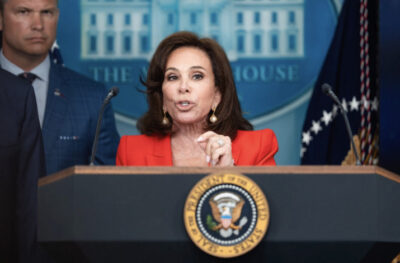By Jack Phillips
Contributing Writer
President Donald Trump signed a proclamation on Wednesday that suspends nationals from 12 countries from entering the United States, and it also restricts people from seven other countries from entering.
Unlike an executive order, a proclamation issued by the president isn’t legally binding but generally signals a shift in official federal government policy. It will go into effect on Monday at 12:01 a.m. ET.
What Countries Are Listed in the Ban?
The 12 countries that face total bans under the proclamation include Afghanistan, Chad, Equatorial Guinea, Eritrea, Haiti, Iran, Libya, Burma (also known as Myanmar), Republic of the Congo, Somalia, Sudan and Yemen.
Under the directive, people from those countries cannot travel to the United States for immigrant or nonimmigrant reasons.
And seven countries that the president partially restricted travel from include Burundi, Cuba, Laos, Sierra Leone, Togo, Turkmenistan and Venezuela.
Trump suspended the entry of individuals from those seven countries “as immigrants, and as nonimmigrants,” on B-1, B-2, B-1/B-2, F, M, and J visas, according to the directive. He also told consular officers to “reduce the validity for any other nonimmigrant visa issued to nationals” of those countries “to the extent permitted by law.”
The directive notes that the people impacted under the ban have to be outside the United States on the effective date of the proclamation and do not have a valid visa on the effective date of this proclamation.
Why Were They Chosen?
The presidential proclamation cites national security and public safety issues, such as terrorism from the 12 banned nations.
“It is the policy of the United States to protect its citizens from terrorist attacks and other national security or public-safety threats,” Trump’s order reads. “Screening and vetting protocols and procedures associated with visa adjudications and other immigration processes play a critical role in implementing that policy.”
For Afghanistan, Trump noted that the Taliban terrorist organization controls the country and doesn’t have the proper vetting measures when issuing passports and other documents.
As for Iran, the directive said that the country’s regime is “a state sponsor of terrorism” and often doesn’t cooperate with the United States on dealing with security matters and has “failed to accept back its removable nationals.”
Somalia also faces similar issues related to terrorism and a lack of an appropriate central government that can vet its nationals, the administration said. But it further stipulated that Somalia has long been considered a haven for terrorist groups.
The directive notes that a significant number of illegal immigrants who originated from Haiti, considered the poorest country in the Western Hemisphere, entered the United States during the previous administration.
“This influx harms American communities by creating acute risks of increased overstay rates, establishment of criminal networks, and other national security threats,” the proclamation reads.
But for a number of other countries, Trump noted that their respective governments had refused to cooperate with the United States to accept individuals who were deported, while the proclamation suggests some of their nationals had higher-than-normal visa overstay rates.
For example, according to the White House, Chad had visa overstay rates of 37%, 49%, and 55%, depending on the type of visa, in 2022 and 2023.
“The high visa overstay rate for 2022 and 2023 is unacceptable and indicates a blatant disregard for United States immigration laws,” the directive said.
Some Exceptions Were Listed
Trump’s directive said that certain nationals from countries listed under the total or partial travel bans can enter the United States under certain exemptions.
They include any lawful permanent resident of the United States, also known as a green card holder, or anyone who is a dual national of the country listed, meaning they are also U.S. citizens.
There is also an exemption for any national from those countries “with a valid nonimmigrant visa in the following classifications: A-1, A-2, C-2, C-3, G-1, G-2, G-3, G-4, NATO-1, NATO‑2, NATO-3, NATO-4, NATO-5, or NATO-6.”
Athletes or members of athletic teams from the banned countries traveling to the World Cup, Olympics, or similar sporting events can also enter the United States, it said.
Other exemptions include people who have “immediate family immigrant visas” with a convincing case, Afghan Special Immigrant Visas, adoptions from those countries, Special Immigrant Visas for U.S. government employees, and Iranian religious and ethnic minority groups persecuted by the government.
How Does This Ban Differ From 2017 Ban?
During his first term in office, Trump in 2017 signed a ban targeting Iran, Iraq, Libya, North Korea, Somalia, Sudan, Syria, Venezuela and Yemen.
The order, often referred to as the “Muslim ban” or the “travel ban,” was retooled amid legal challenges until a version was upheld by the U.S. Supreme Court in 2018. Trump and others have defended the initial ban on national security grounds, arguing it was aimed at protecting the country and not founded on anti-Muslim bias.
Trump’s latest directive doesn’t include North Korea, Iraq, or Syria.
The travel ban results from a Jan. 20 executive order Trump issued requiring the departments of State and Homeland Security and the Director of National Intelligence to compile a report on “hostile attitudes” toward the United States and whether entry from certain countries represented a national security risk.
Early Reactions to the Ban
Some international aid groups and immigration-related groups were critical of the directive.
The International Refugee Assistance Project, in a statement on Wednesday, claimed that the move “weaponizes and distorts immigration laws to target people that the president dislikes and disagrees with” and would create chaos.
Meanwhile, the African Union Commission expressed concern on Thursday about the “potential negative impact” of the ban on educational exchanges, business ties, and broader diplomatic relations between some African countries listed in the directive and the United States.
“The African Union Commission respectfully calls upon the U.S. administration to consider adopting a more consultative approach and to engage in constructive dialogue with the countries concerned,” the commission said in a statement.
In a video released on social media, Trump tied the new ban to Sunday’s terror attack in Boulder, Colorado, saying it underscored the dangers posed by some visitors who overstay visas.
The suspect in the attack is from Egypt, a country that is not on Trump’s new list. The Department of Homeland Security stated that he overstayed a tourist visa.
According to the directive, Trump said that during the visa-issuance process, U.S. officials must ensure that foreign nationals “do not intend to harm Americans or our national interest” and “must identify such aliens before their admission or entry into the United States.”
His immigration policy also stipulates officials “must ensure that admitted aliens and aliens otherwise already present in the United States do not bear hostile attitudes toward its citizens, culture, government, institutions, or founding principles, and do not advocate for, aid, or support designated foreign terrorists or other threats to our national security.”
The Associated Press contributed to this report.








